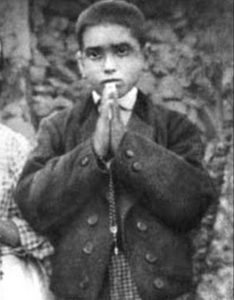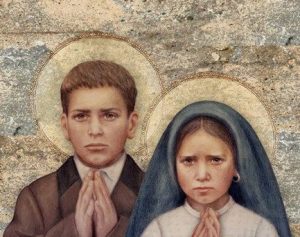June 11th-1908 / ✝︎April 4th-1919
In contrast to Jacinta, Francisco was quite different. He had an easy manner, and was always friendly and smiling, playing with all the children without distinction. He did not rebuke anybody. All he did was to go aside, whenever he saw anything that was not as it should be. If he was asked why he went away, he answered:
“Because you’re not good”, or “Because I don’t want to play anymore.”
During his illness, the children ran in and out of his room with the greatest freedom, talked to him through the window and asked him if he was feeling better, and so forth. If he was asked whether he wanted some of the children to stay with him and keep him company, he used to say that he preferred not, as he liked to be alone.
He would say to me sometimes: “I just like having you here, and Jacinta too.”
When grown-ups came to see him, he remained silent, only answering when directly questioned, and then in as few words as possible. People, who came to visit him, whether they were neighbors or strangers, often spent long periods sitting by his bedside, and remarked:
“I don’t know what it is about Francisco, but it feels so good to be here!”
Some women from the village commented on this one day to my aunt and my mother, after having spent quite a long time in Francisco’s room:
“It’s a mystery one cannot fathom! They are children just like any others, they don’t say anything to us, and yet in their presence one feels something one can’t explain, and that makes them different from all the rest.”
“It seems to me that when we go into Francisco’s room, we feel just as we do when we go into a church,” said one of my aunt’s neighbors, a woman named Romans, who apparently did not believe in the Apparitions.
There were three others in this group also: the wives of Manuel Faustino, José Marto and José Silva.

I am not surprised that people felt like that, being accustomed to find in everyone else only the preoccupation with material things which goes with an empty, superficial life. Indeed, the very sight of these children was enough to lift their minds to our heavenly Mother, with whom the children were believed to be in communication; to eternity, for they saw how eager, joyful and happy they were at the thought of going there; to God, for they said that they loved Him more than their own parents; and even to hell, for the children warned them that people would go there if they continued to commit sin. Externally, they were, so to speak, children like all others. But if these good people, so accustomed to the material side of life, had only known how to elevate their minds a little, they would have seen without difficulty that, in these children, there was something that marked them out as being different from all others.
I have just remembered something else connected with Francisco, and I am going to relate it here.
A woman called Mariana, from Casa Velha, came one day into Francisco’s room. She was most upset because her husband had driven their son out of the house, and she was asking for the grace that her son would be reconciled with his father. Francisco said to her in reply:
“Don’t worry. I’m going to Heaven very soon, and when I get there I will ask Our Lady for that grace.”
I do not recall just how many days remained before he took his flight to Heaven, but what I do remember is that, on the very afternoon of Francisco’s death, the son went for the very last time to ask pardon of his father, who had previously refused it because his son would not submit to the conditions imposed.
Francisco sees the devil
How different is the incident that I now call to mind. One day we went to a place called Pedreira, and while the sheep were browsing, we jumped from rock to rock, making our voices echo down in the deep ravines.
Francisco withdrew, as was his want, to a hollow among the rocks. A considerable time had elapsed, when we heard him shouting and crying out to us and to Our Lady. Distressed and thinking something might have happened to him, we ran in search of him, calling out his name.
“Where are you?”
“Here! Here!”
But it still took us some time before we could locate him. At last, we came upon him, trembling with fright, still on his knees, and so upset that he was unable to rise to his feet.
“What’s wrong? What happened to you?”
In a voice half smothered with fright, he replied:
“It was one of those huge beasts that we saw in hell. He was right here breathing out flames!”
I saw nothing, neither did Jacinta, so I laughed and said to him:
“You never want to think about hell, so as not to be afraid; and now you’re the first one to be frightened!”
Indeed, whenever Jacinta appeared particularly moved by the remembrance of hell, he used to say to her:
“Don’t think so much about hell! Think about Our Lord and Our Lady instead. I don’t think about hell, so as not to be afraid.”
He was anything but fearful. He’d go anywhere in the dark alone at night, without the slightest hesitation. He played with lizards, and when he came across any snakes he got them to entwine themselves round a stick, and even poured sheep’s milk into the holes in the rocks for them to drink. He went hunting for foxes’ holes and rabbits’ burrows, for genets, and other creatures of the wilds.

The words of the Angel in the third Apparition: «Console your God» seemed to have quite a considerable effect on the little Shepherd’s soul. He only tried to think about how to console God our Lord and our Lady who seemed to be so sad to him.
What wholly absorbed him, was God, the Most Holy Trinity, perceived in that light which penetrated our inmost souls. Afterwards he said:
“We were on fire in that light which is God, and yet we were not burnt! What is God…? We could never put it into words. Yes, that is something indeed which we could never express! But what a pity is it that He is so sad! If only I could console Him…”
During his illness he revealed to his cousin:
“Is Our Lord still so sad? I am heartily sorry He is sad. I offer him up so many sacrifices as I can”.
On his death eve he confessed and received Holy Communion with the most pious feelings. After five months of continuous sufferings, the little consoler of Jesus passed away on April 4th of 1919, a first Friday, at ten o’clock in the morning.


